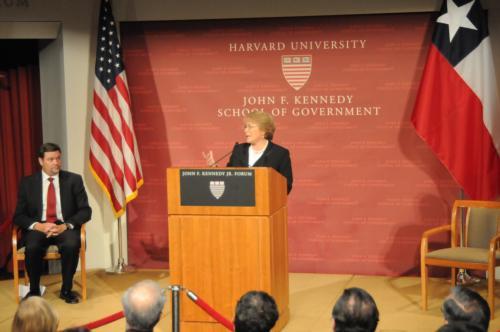
News
Harvard Quietly Resolves Anti-Palestinian Discrimination Complaint With Ed. Department

News
Following Dining Hall Crowds, Harvard College Won’t Say Whether It Tracked Wintersession Move-Ins

News
Harvard Outsources Program to Identify Descendants of Those Enslaved by University Affiliates, Lays Off Internal Staff

News
Harvard Medical School Cancels Class Session With Gazan Patients, Calling It One-Sided

News
Garber Privately Tells Faculty That Harvard Must Rethink Messaging After GOP Victory
Chilean Leader Focuses On Democracy

Chilean President Michelle Bachelet emphasized that the success of democracy in Latin America is contingent on the involvement and equality of citizens, in a speech at the Institute of Politics last night.
According to Bachelet, who was elected Chile’s first female president in 2006, democracy in Latin America has reached a point where its implementation is no longer on everyone’s minds, making the system vulnerable to an increase in apathy and institutional distrust among citizens.
“What I mean is not that I am a pessimist, but we have a lot of things to do to consolidate a powerful democracy and make citizens feel a part of this democracy,” Bachelet said.
Bachelet was blunt about the difficulties Chile has experienced in implementing democracy but looked at them as lessons in how to enact democratic policies more effectively in the future.
“Let me be clear: Latin America’s democratic regimes are still afflicted by many shortcomings because institutions are not as strong as they should be,” she said.
Bachelet, a member of the Chilean Socialist Party, emphasized the need to combat economic and ethnic inequality in Latin America.
“I’m convinced that inequality comes from the crib,” Bachelet said. “You have to give a child the best conditions from when they’re born so you can level the playing field.”
She advocated for a strong state committed to following the country’s laws as a way to spread equality among citizens. She also promoted government regulation of the economy when it can help provide a more equal playing field.
“It’s an honor to have such an intelligent president with such a clear idea of democracy that economics is not everything and people are important,” said Kenzo J. Asahi, a native of Chile and a second-year masters student in public administration at the Kennedy School, who attended the lotteried event.
A former surgeon, pediatrician, and epidemiologist, Bachelet served as Chile’s minister of health and minister of defense before being elected president. While a medical school student, Bachelet served as a member of the Socialist Youth in Chile and was captured and tortured in 1975 during the rule of Chilean dictator Augusto Pinochet.
During the question-and-answer session, Bachelet responded to a question about how her government compares to those of other Latin American countries, specifically Venezuela. While she said that all the governments share common objectives of tackling poverty and creating better opportunities for their people, she acknowledged that they have chosen to go about it in very different ways.
“People have paid a lot of attention to the Chavez model and due attention has to be given to the Chilean model,” said Soo Min Seo, a first-year masters student in public policy at the Kennedy School.
Despite the weighty topics she discussed, Bachelet kept a light-hearted demeanor throughout her speech and made the audience laugh at several points. The largest laugh of the evening came when she colored her discussion about the need for a strong state with her knowledge of the current U.S. presidential race.
“As a state, we can make a difference,” she said. “Yes we can. I don’t want anyone to think this is a reference to a specific person. Remember, I also wear lipstick.”
—Staff writer Lauren D. Kiel can be reached at lkiel@fas.harvard.edu.
Want to keep up with breaking news? Subscribe to our email newsletter.
